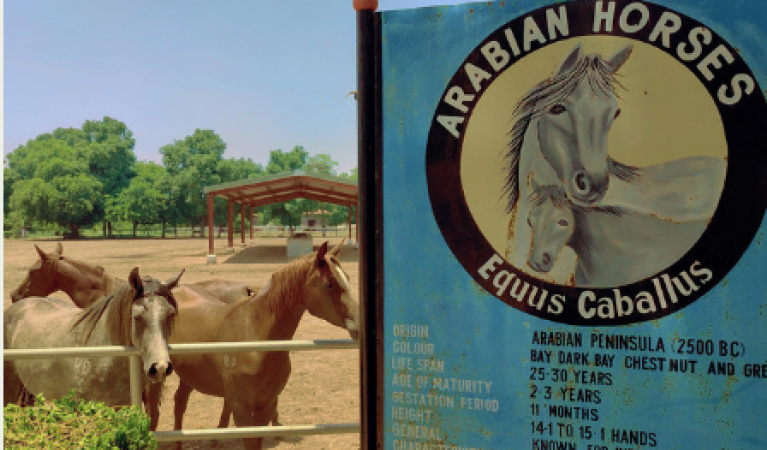
Mona: One of the most recognisable horse breeds in the world is the Arabian, with its long, arched neck, refined wedge-shaped head, and high tail carriage.
It is also among the oldest, with over 4,500 years of archaeological evidence pointing to the existence of horses in the Middle East that resemble modern Arabians today.
At the Remount Depot Mona military facility in Mandi Bahauddin, Pakistan, you can find over 600 Arabian horses that have been specially trained for dressage competitions and equestrian competitions.
Also Read: As more Syrians naturalise, the number of new German citizens rises to a 20-year high
The depot, which was established in 1902 and spans 10,000 hectares of land with roads, buildings, a canal, and a train line, is a centre for raising and breeding horses, donkeys, and mules.
Nearly 70 years ago, Pakistan began importing Arabian horses, frequently entering them as prized show animals in competitions and keeping a collection as gifts for foreign dignitaries.
According to Brig. Mohammed Naeem, the commandant of the depot, Pakistan has 808 Arab horses that are registered with the World Arabian Horse Organisation, 627 of which are from the Remount Depot Mona and only 181 are from throughout the nation.
The 1970-founded WAHO is a charity with 82 affiliated nations that works to preserve pure Arabian bloodlines, advance breeding knowledge internationally, organise member clubs, create breed terminology uniformity, and provide advice on other Arabian horse-related issues.
Also Read: The US asserts that Sweden should formally join NATO and that Turkey should purchase new F-16s.
The oldest known breed of horse is the Arabian horse, which came from the Arab Peninsula around 2,500 B.C., according to Naeem. He also noted that the horses were renowned for their "exceptional beauty," especially when they ran and raised their tails to display their "elegant form."
Although the breed's exact origins are unknown, it is believed to have started on the northern edge of the Syrian desert.
They are regarded as one of the most well-known horse breeds in the world, continued Naeem.
Pakistan joined WAHO in 1997, and Mona Remount Depot served as the organization's lone representative there. The Depot started horse breeding as a hobby in 1956, but it eventually became a science.
Our facility has so far successfully witnessed the birth of 15 test tube babies, and another 12 pregnancies are still going on, according to Naeem.
The first Arab horse at the depot was brought in from the US in 1955, and 31 more came later from various nations.
According to Naeem, the cost of an imported Arabian horse can range from $5,000 to $50,000, depending on the animal's quality and pedigree.
According to the animal's country of origin and whether it is transported in a single cage or a group cage, import costs also differ. It costs about $10,000 from Gulf states, but up to $20,000 from Western nations and the US.
The brigadier reported that the cost of breeding, raising, and training an Arabian was "significantly lower at the depot due to locally produced fodder and other factors."
According to Naeem, "the depot's budget is provided by the Ministry of Defence."
The brigadier stated that a stable of Arab horses was also kept for the Pakistani government and army to give as gifts to visiting dignitaries.
According to Naeem, 36 animals have been given to various heads of state from Saudi Arabia, the UAE, Qatar, Bangladesh, Sri Lanka, and other nations.
Over the past few decades, the leaders of Jordan, Qatar, and Saudi Arabia have all given horses to the leaders of Pakistan at various times.
Gen. Mohammed Zia ul Haq, the sixth president of Pakistan, received an Arabian horse from King Faisal, he said, adding that Gen. Pervez Musharraf received a horse from the Saudi king as well. The tenth president of Pakistan was Musharraf.
According to Naeem, horses that were gifts to the Pakistani government were always kept at the depot.
Experts categorise the Arabian as a "hot-blooded" breed because of its sensitivity and intelligence, which facilitate quick learning and improved communication with riders. For this reason, the breed is prepared for equestrian competitions like polo, dressage, and tent pegging.
Our horses, which are trained specifically for vaulting and show jumping, serve a variety of purposes, according to Naeem.
The brigadier added that one of the depot's Arabian horses had won Pakistan's best polo pony award six times.
Mohammed Rasaldar, a trainer at the facility who conducts daily training sessions with the horses that begin at 6 a.m. and last throughout the day, said of the animals, "These horses are highly responsive animals." "They become more attached and receptive as they experience more love and attention.
"We have a 39-week training programme for them where we expose them to different environments to help them overcome their fears...During this course, they also receive training for various games.
Also Read: 'Very close' to finding children who have been missing in the Colombian Amazon
The horses, according to Mohammed Akhtar, who trains them for polo, obey all commands.
He asserted that although horses are strong animals, they can only be tamed by treating them with a lot of love and compassion during training.